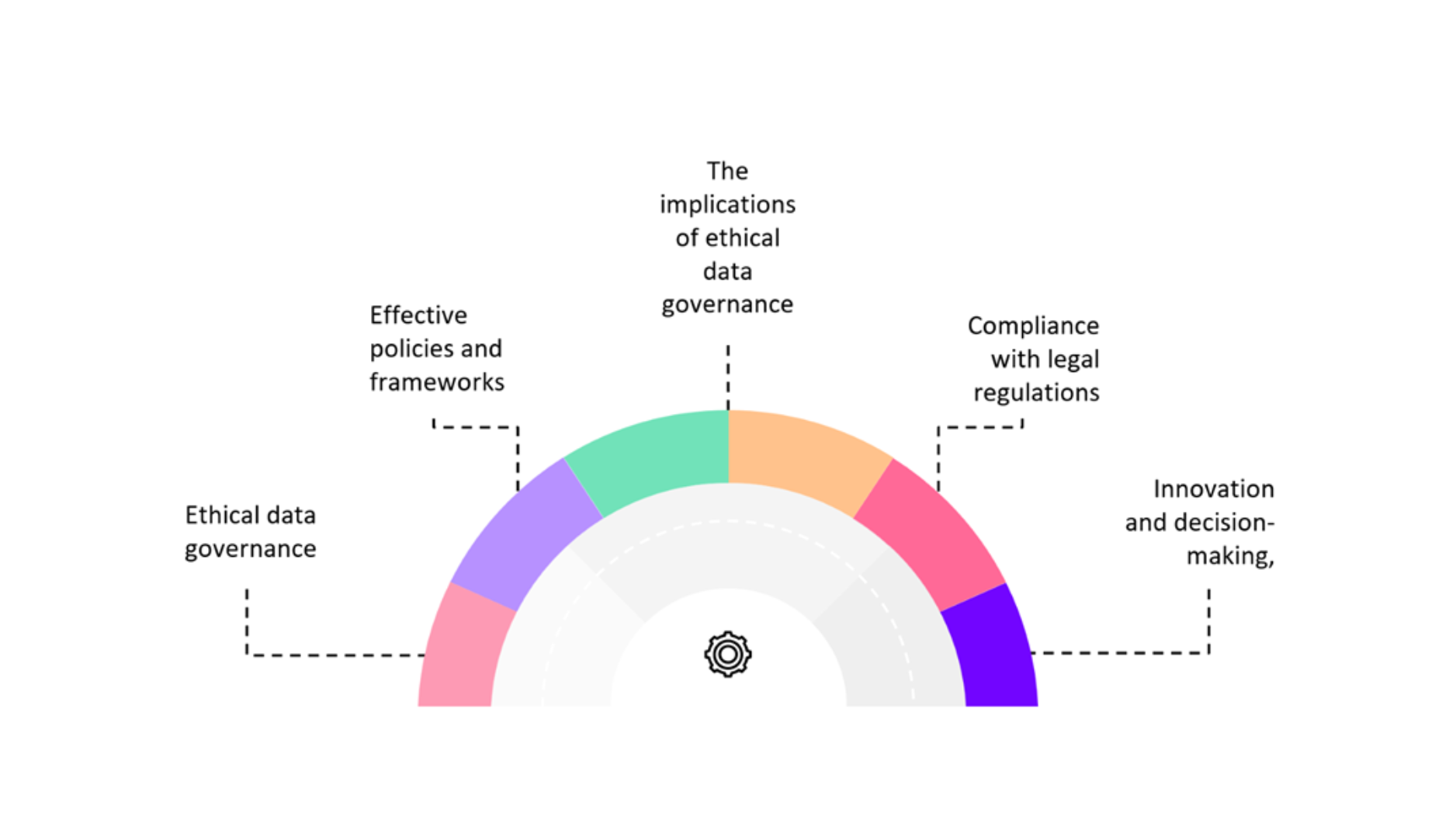
Guardians of data: Ensuring ethics in the digital world
"Ethical data governance is essential to ensure privacy, fairness, transparency and accountability in the handling of data across sectors. It involves implementing policies that protect individual rights and promote trust, with significant implications for healthcare, finance, education and public trust", says our HSLU lecturer, Dr Dimitrios Marinos. As data-driven decision making becomes more prevalent, the importance of ethical practices in data governance continues to grow, influencing legal frameworks and societal norms. Read more to learn how data and ethics are intertwined.
Shortcuts:
Intro | Fairness, transparency, accountability | Healthcare and financial sectors | Big Data, AI and GDPR | Social justice, equity and education Conclusion |Info-Events | Programme Information | Contact

Dr Dimitrios Marinos, our lecturer at HSLU, has deep expertise in artificial intelligence, big data analytics, digital transformation, AI ethics, data governance and more.
The core of data governance
The ethical use of data is a central concern in the field of data governance, where the principles of privacy, fairness, transparency and accountability are intertwined. As data becomes increasingly central to decision making in various sectors, the need for ethical data governance frameworks becomes more urgent. These frameworks ensure that data is handled in a way that respects individual rights and societal norms, thereby fostering trust and sustainability in data-driven practices.
At its core, ethical data governance involves the development and implementation of policies that guide the collection, storage, processing and sharing of data. These policies are based on ethical principles that prioritise the protection of individual privacy, the prevention of harm, and the promotion of fairness and equity. Privacy is a fundamental element as it concerns the right of individuals to control their personal information. Effective data governance frameworks must incorporate robust privacy protections, such as minimising data collection to what is necessary, ensuring data accuracy, and securing data against unauthorised access and breaches.

Fairness, transparency, accountability
Fairness in data governance refers to the equitable treatment of individuals and groups in data processes. This includes preventing bias in data collection and algorithmic decision-making that could lead to discriminatory outcomes. Data governance policies should ensure that data sets are representative and that algorithms are regularly tested for bias.
Transparency is also critical to ethical data governance. Organisations must be open about their data practices and provide clear information about how data is collected, used and shared. This transparency helps build trust with stakeholders, including customers, employees and regulators.
Accountability is another crucial aspect of ethical data management. Organisations need to be accountable for their data practices, with clear roles and responsibilities for data management. This includes implementing oversight and enforcement mechanisms, such as data protection officers and independent audits. Accountability also means providing individuals with the means to challenge and correct inaccuracies in their data, and ensuring that their rights are upheld.
Examples from the healthcare and financial sectors
The implications of ethical data management are far-reaching, affecting different sectors and society as a whole. In healthcare, for example, the ethical use of data can improve patient outcomes while protecting patient privacy. Healthcare providers can use data to improve diagnosis and treatment. But they must do so in a way that meets ethical standards and legal requirements. This includes obtaining patient consent for data use, anonymising data to protect identities, and ensuring that data sharing is done with the utmost care.
In the financial sector, ethical data governance is essential to prevent fraud, protect consumer privacy and promote financial inclusion. Financial institutions collect vast amounts of personal and transactional data that, if misused, can cause significant harm. Ethical governance frameworks help these institutions manage data responsibly, ensuring that customer data is protected and used to improve service delivery without compromising privacy or fairness.
Extra players: Big Data, Artificial Intelligence (AI) and GDPR
The rise of big data and artificial intelligence (AI) presents both opportunities and challenges for ethical data governance. Big data enables organisations to uncover insights and patterns that can drive innovation and efficiency. However, the sheer volume and variety of data being collected raises privacy and consent concerns. AI systems, which often rely on large data sets, can inadvertently perpetuate biases present in the data. Therefore, ethical data governance must address these challenges by implementing practices that ensure data quality, mitigate bias, and maintain transparency in AI processes.
The implications of ethical data governance extend to regulatory and legal frameworks. Governments and regulatory bodies are increasingly recognising the importance of data ethics. They are enacting laws and regulations to enforce ethical standards. The General Data Protection Regulation (GDPR) in the European Union is a prime example, setting strict requirements for data protection and privacy. Compliance with such regulations is not only a legal obligation, but also an ethical imperative for organisations. While these regulations help establish a baseline for ethical data practices, organisations must go beyond mere compliance to foster a culture of ethics in data governance.
About social justice, equity and education
Moreover, the ethical use of data has significant implications for social justice and equity. Data-driven decision-making can either perpetuate or mitigate social inequalities. For example, biased data and algorithms can reinforce systemic discrimination in areas such as hiring, lending and law enforcement. Ethical data governance requires organisations to proactively address these issues by ensuring that their data practices do not disproportionately harm marginalised communities. This includes adopting inclusive data collection methods, auditing algorithms for bias, and engaging with diverse stakeholders to understand the societal impact of data use.
In education, ethical data governance can improve learning outcomes while protecting student privacy. Educational institutions collect a wide range of data about students, from academic performance to personal information. Ethical governance frameworks ensure that this data is used to support student success without violating student privacy. This includes obtaining informed consent from students and parents, anonymising data, and using data analytics to identify and support at-risk students in a fair and respectful way.
Public trust in the data-driven world is fragile
The implications of ethical data management also extend to the realm of public trust. In an era where data breaches and misuse are increasingly common, public trust in data-driven organisations is fragile. Ethical data governance helps build and maintain that trust by demonstrating a commitment to responsible data practices. Organisations that prioritise ethics in their data governance are more likely to earn the trust and loyalty of their customers, employees and partners. This trust, in turn, can become a competitive advantage that drives long-term success and sustainability.
The ethical use of data is a fundamental component of effective data governance. By adhering to principles of privacy, fairness, transparency and accountability, organisations can responsibly navigate the complexities of the data-driven world. The impact of ethical data governance is profound, influencing sectors such as healthcare, finance and education, and shaping societal norms and regulatory frameworks. As data continues to drive innovation and decision-making, the importance of ethical data governance will only grow, underscoring the need for organisations to embed ethical considerations into their data practices.
We would like to thank Dr Dimitrios Marinos for his dedication and for sharing these valuable insights.
Start your career with the MSc in Applied Information and Data Science now!
Register and join us for a free online Info-Event:
Monday, 9 March 2026 (Online, English)
Monday, 13 April 2026 (Online, German)
Monday, 11 May 2026 (Online, English)
Monday, 8 June 2026 (Online, German)
Programme Info: MSc in Applied Information and Data Science
More Field Reports & Experiences: Professional portraits & study insights
Frequently Asked Questions: FAQ


